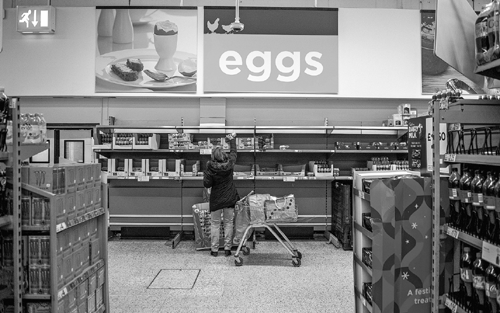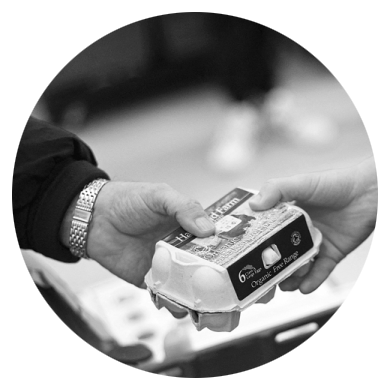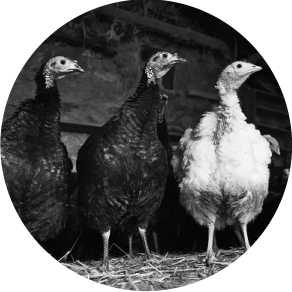UK shortages egged on by several crises
From avian flu, to rising energy costs and labor shortages, Britain's agricultural sector is facing a bleak 2023. However, there may be lessons to learn from China, Xing Yi reports in London

Since mid-November, grocery shoppers in London have noticed something weird in the local supermarket chains Tesco and Lidl: People can't always find eggs on the shelves. Where normally boxes of different kinds of eggs used to be, instead, they find notices that read: "We are limiting these products to three per customer, so that everyone can get what they need."
In some other supermarket chains, such as Asda, the quota for egg purchases per person has been set at two boxes. And according to the British Free Range Egg Producers Association, the rationing will last beyond Christmas.
The direct cause of the egg supply shortage is a widespread bird flu pandemic that has been raging since last year, and which hit the United Kingdom the worst. The association said that bird flu-related culls had claimed 750,000 laying hens since Oct 1 alone, compared with 1.8 million over the whole of last year.
Could the avian flu become the last straw to a slow-burn food supply crisis in the UK, aggravated by the cost-of-living crisis, the Russia-Ukraine conflict, and a post-Brexit shortage of labor? The answer remains to be seen, but the affected farmers and consumers are the ones currently suffering.
Besides egg rationing, the price of turkeys has also gone up: Among 27 like-for-like products of Christmas birds available last year and now, all but one had seen a price rise of at least 12 percent. The average price increase was 24.4 percent across this group, according to a report based on data from supermarket analysts Assosia.
The biggest jump was a 45.3 percent increase in the price of a Morrisons British large whole turkey to £31.44 ($37,92), and even the price of frozen turkeys rose by around 18.1 percent, it showed.
Half of the 1.2 million free-range turkeys and geese reared for Christmas in the UK have been killed or culled because of the bird flu, according to Richard Griffith, chief executive of British Poultry Council.
"This year is the worst bird flu that we've ever seen. Around 36 percent of poultry farms in the country are covered by some form of control," he told a Parliamentary hearing of the environment, food and rural affairs committee on Nov 29. "The on-costs for industry and food production are potentially enormous."
A report published by the House of Lords Library in November said that the UK has experienced its largest outbreak of bird flu, an outbreak that led to the death of 97 million birds globally and 3.8 million in the country, with significant consequences for agriculture.
"Experts have warned that infections could rise even higher over the winter of 2022-23," said the report, adding that the UK government has imposed mandatory housing for all poultry, amended its culling compensation scheme and relaxed the sale regulations of defrosted poultry.
But the compensation for farmers was deemed "unfair", as payment is only made for healthy birds that are culled by government vets. Because the current strain of bird flu kills birds so quickly, a large number of them die between notification of infection by farmers and the arrival of the vets for culling.
Paul Kelly, a poultry farmer at Kelly Turkeys, said: "The current compensation scheme dates back to 1981, that's when avian influenza was 'low pathogenic' and it didn't kill the birds, but the problem now is that it turned into 'high pathogenic' and the infected turkeys die within four days."
Three of Kelly's poultry farms have been hit by the bird flu this year. "In one farm with 9,500 turkeys, the first infection was on Thursday evening, with 20 mortalities. By Monday lunchtime, they were all dead," he said. "It's devastating."
Robert Goodwill, chair of Parliament's environment, food and rural affairs committee, wrote a letter to the Cabinet in November, asking for a revision of the compensation rule, as "this can have a particular impact on smaller producers who keep birds in a single location and can lose their entire flock during an outbreak.
"If the sector is not able to restock, the supply issues we are seeing will continue to get worse, making the UK more reliant on imports and undermining our food security," wrote Goodwill.
Rising energy costs
Moreover, it is not only the stable production of Christmas poultry and eggs that are at risk, so are fruits and vegetables, but for other causes — labor shortages and rising energy costs.
Scholars have long established the links between energy and food security, and found agricultural food prices rise with any fluctuation in oil prices, and an inflation in the price of oil threatens not only energy security, but food security as well.
Earlier this year, the World Bank said in a report that the increase in energy prices over the past two years has been the largest since the 1973 oil crisis. Price increases for food commodities and fertilizers, which rely on natural gas as a production input, have been the largest since 2008.
In November, Britain faced an inflation increase of 11.1 percent, a 40-year high, a large part of which is contributed to by soaring energy prices.
According to Britain's National Farmers' Union, which represents more than 46,000 farming businesses in the UK, this year, energy-intensive crops, including tomatoes, cucumbers and pears, are on track for their lowest recorded yields since 1985.
It also told the BBC that milk prices were likely to fall below the cost of production, while beef farmers were considering reducing the number of cows they breed. Rising costs were to blame, it said, with fertilizer prices for farmers more than tripling since 2019 and the cost of feed and diesel up by 75 percent.
" (There are) huge issues for pigs, for poultry meat, for eggs, for fresh produce," NFU's president, Minette Batters, told journalists, warning that more agricultural companies have been pushed out of business, as there were currently 7,000 fewer registered agricultural companies in the UK than in 2019.
But, in December, the UK's Secretary of State for Environment, Food and Rural Affairs, Theresa Coffey, ruled out government measures of intervention to help farmers and consumers. The Guardian reported that Coffey acknowledged the growing demand for food banks around the country, and pointed to steps such as the forthcoming increase in benefits and measures to reduce energy bills, but declined to promise any further support.
She said: "It is not the role of the government to provide free food."
Besides the soaring energy costs that drove down food production, getting enough labor into the UK has become a particular issue since Brexit was officially completed in 2020.
Tom Bradshaw, deputy president of NFU, wrote a letter to the UK's immigration minister on Nov 29, expressing the union's concern over visas for next year's seasonal workers.
The current Seasonal Worker Scheme was launched by the Johnson government in March 2019 with an initial quota of 2,500 places per year, and currently stood at 38,000, plus another 2,000 for poultry workers.
The Johnson Government said that the quota would be reduced to 30,000 in 2023 and 28,000 in 2024. By contrast, during the short premiership of Liz Truss, the government increased the quota.
However, there has been no confirmation that an increase will be pursued under the current prime minister, Rishi Sunak, nor has there been an announcement on the future of the scheme beyond 2024.
"The news that the Seasonal Workers Scheme is guaranteed until 2024 was a welcome boost for growers last year. However, we remain concerned that the number of visas available are not sufficient to prevent further crop losses and a continued fall in UK production," Bradshaw said.
According to NFU surveys, more than£22 million worth of fruit and vegetables has been wasted directly due to workforce shortages in the first half of this year, and the NFU said the sector requires 70,000 workers.
"It's nothing short of a travesty that quality, nutritious food is being wasted at a time when families across the country are already struggling to make ends meet because of soaring living costs," said Bradshaw.
"This means increasing the number of visas available to meet the sector's needs and expanding it to a minimum five-year rolling scheme to enable growers to have the confidence to invest in their businesses."
Important factors
However, a report by researchers from University of Oxford and Leeds University, based on the immigration data since 2019, suggested that Brexit is not the only reason for the labor shortage, adding that the pandemic, international sector-specific labor shortages, and an increase in early retirement have been more important factors.
The report co-author, Chris Forde of Leeds University, said: "While there is some evidence that the end of free movement has contributed to shortages in some areas of the UK labor market, it is by no means the only driver. In fact, recruiting difficulties are not unique to the UK and several other countries have experienced high vacancy rates post-pandemic."
The UK is just one of the many countries facing a food supply challenge, which is the fallout of the pandemic, the conflict between Russia and Ukraine, and the more frequent extreme weather due to climate change.
According to the 2023 Global Humanitarian Overview, by the end of this year, more than 222 million people across 53 countries may suffer from acute food insecurity, putting their lives or livelihoods in danger because they do not have enough to eat.
Next year will set another record for humanitarian relief requirements, with 339 million people in need of assistance in 69 countries, an increase of 65 million people compared to the same time last year, the United Nations and partner organizations said on Dec 1.
To tackle the crisis, the UK government has published its Government Food Strategy in June, in which it stated the country is largely self-sufficient in wheat, meats, eggs, and some sectors of vegetable production, and that, for the past 20 years, the UK has produced around 75 percent of what its people consume, which the government is committed to maintaining in the future.
It also noted that, to keep food prices down, barrier-free food trade is required, and it called upon all countries, including those in the World Trade Organization, to keep food trade flowing and avoid trade-restrictive measures.
Sustainable diet
Promoting a healthier and sustainable diet was stressed in the strategy, as the latest data shows that around 64 percent of adults and 40 percent of children in England are overweight or living with obesity due to the "Junk Food Cycle", which means food companies invest more money creating calorie-dense foods to makes people eat more of them and expand the market, leading to a feedback loop promoting more investment and making people eat more.
An analysis by consulting firm SYSTEMIQ shows that by cutting meat production by just 13 percent — the equivalent of European consumers going meat-free for one day a week — the EU could reallocate enough grain and land currently used to feed livestock to offset the 23 million metric tons of wheat produced by Ukraine in 2020.
Sarah Lake, executive director of Madre Brava, a nonprofit organization advocating the reduction of the centrality of meat in food sales, said in a commentary to China Daily: "Simply put, the meat industry's inefficient use of fertilizers drives up food prices, exacerbates world hunger, and pushes farmers into poverty.
"Reallocating land from meat production to grains, vegetables, legumes, and alternative proteins would be a far more effective way to feed a growing population on a warming planet."
China example
To put the food crisis issue in a broader context, some scholars suggested that the global food crisis is the natural consequence of the international capitalist food system, in which developed countries buy cheap food from around the world to sustain their industrialization.
Xu Zhun, associate professor of economics at The City University of New York, wrote an article Granary or Food Crisis: Coming Out of the 200-Year International Food System, arguing that the large-scale food trade emerged as a result of unequal development of capitalism, while the UK, as the first industrial country, sought food supplies from its colonies. After World War II, the United States supplanted the UK and dominated the global food system by exporting its cheap agricultural products to the countries in the Third World.
"It's not saying to stop food trade, but developing countries should be able to hold the rice bowl in their own hands… countries should see food production, farmers and the agricultural industry as a whole development strategy," said Xu.
"China is a good example. It participated in the global trade of agricultural products, but in general, it has maintained autonomy in the process of industrialization and urbanization," he added.
China has long adopted a national strategy for food security, characterized by self-sufficiency based on domestic grain production, moderate imports and technological support. It has also established a strict farmland protection system and adopted a policy to ensure the sustainable use of farmland and self-reliance in seeds.
Earlier in October, Cong Liang, director of the National Food and Strategic Reserves Administration, said China's ability to ensure its national food security continues to improve, with grain output reaching a record high of 683 million metric tons last year.
"With good grain conditions, our rice bowls are held firmly in the hands of Chinese people and are mainly filled with Chinese food," Cong said.
China has also been providing support to African countries for more than two decades, with farming techniques and personnel training. The continent has 60 percent of the world's potentially arable land, but many African countries still suffer from food insecurity and a low-productive agricultural sector.
Philip Isdor Mpango, vice-president of Tanzania, said during the Averting a Global Food Crisis session at the World Economic Forum in May, that more investment is needed in agriculture, including in irrigation, rural roadbuilding, and involving the younger population of the continent.
"We must strategize so that we have the young people involved throughout the agricultural value chain," he said. "If we do this for the very short term in Africa, we can turn this crisis into an actual opportunity for the continent. But, critically, it is important that we get global partnerships, and this is what has changed on the continent recently."



Today's Top News
- China plans to venture farther into deep space
- Hainan FTP's independent customs operation set to boost market vitality
- Sea of peace, friendship and cooperation, not an arena for Washington's geopolitical games
- China, US to continue trade talks in Sweden
- Japanese PM denies reports he will resign next month
- China is one of the safest countries in the world: official






























